Today SevenPonds is speaking with Heather Michet, a Registered Aromatherapist, Essential Oil Therapist and Reiki Master from Sandy, Oregon. The owner of Iris Healing Arts, Heather is a former civil engineer who transformed her personal interest in natural healing into a thriving holistic practice. Using a combination of natural solutions, energy healing and aromatherapy, Heather helps clients from all over the world lead more balanced and healthier lives.
An accomplished vocalist, Heather also performs at memorial services, blessings and funerals, using the soothing vibration of a cappella music to create meaning and connection for the friends and families of those who have died.
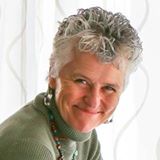
Heather Michet
Kathleen: Thanks so much for speaking with me today, Heather. I’d like to start our conversation by admitting that I’m not very knowledgeable about aromatherapy or Reiki. Can you tell me a little bit about what you do?
Heather: Certainly! My practice is based on the concept that the root cause of all illness is congestion, or blockage, in the flow of the body’s vital energy — what the Chinese refer to as “chi,” and the Japanese call “ki.” In fact, in Japanese, the term “Reiki” is a combination of the words “rei’ and “ki,” which translates to “spiritually guided life-force energy.”
I am not a physician, so I do not diagnose or treat disease. What I do, instead, is assess, assist and suggest ways to help my clients live healthier, more balanced lives. I evaluate each person based on a number of things — for example, their medical history, physical appearance, food intake and degree of self care. I also practice “deep listening.” That is, I have conversations with my clients and really listen to what they have to say–what their lives are like and what challenges they face.
With all of that information I develop a profile–a picture of the client’s physical, emotional and spiritual health. From there, I develop a list of suggestions that address the needs of the whole person, which I call a “vibrant health plan.”
Kathleen: Do you work with many people who are facing health challenges, such as a terminal illness, or those who are at the end of life?
Heather: Absolutely. I work with people at all stages of wellness. Some of my clients are dealing with cancer and other life-threatening illnesses, and some are terminally ill. I also work extensively with caregivers, who are often so enmeshed in meeting the needs of their loved ones that they fail to properly care for themselves.
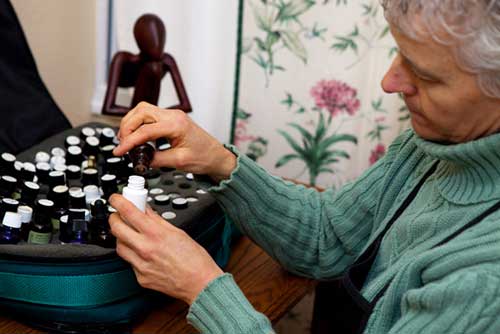
Heather Michet blending essential oils
Kathleen: Can you explain a little bit about how aromatherapy works?
Heather: Aromatherapy is a powerful means of stimulating the limbic system, the part of the brain responsible for emotion and memory. For most of my clients, I create a custom blend of essential oils that they apply in two ways — around the nose or as a spray to stimulate the olfactory system (the sense of smell) and as a topical cream or lotion, which delivers the essential oils directly into the bloodstream. Each blend is tailored to meet the client’s specific health needs. For example, some blends help calm the nervous system and decrease pain. Others stimulate the immune system.
Kathleen: So all of your aromatherapy blends are tailored to the individual client?
Heather: Generally, yes. Aromatherapy is powerful “plant derived medicine,” and like any medicine it can have significant side effects if it is used improperly. As I tell my clients, “You cannot have a highly effective medicine and have it be benign.”
With that said, however, I do offer a number of very effective blends for the general public on my website. For example, my Tranquility Blend is excellent for caregivers, those who are grieving and people who are at the end of life, and Fresh Air Fare is great for boosting the immune system and fighting fatigue. That’s very important for caregivers and people who are living with chronic illness.
Kathleen: Do Reiki and aromatherapy complement each other? Do you typically use them together to address your client’s needs?
Heather: Yes. The modalities I use are based on four universal, complementary elements: air, earth, fire and water. Reiki represents fire–the natural energy of the universe. Aromatherapy, because it is derived from plants, represents earth. My singing represents air. And water, well, water makes up about 70 percent of our bodies, but in our society almost no one gets the amount of water they need. In fact, most people I encounter in my practice are chronically and severely dehydrated, which affects every aspect of their health.
As much as possible, I integrate all of these elements into each client’s vibrant health plan.
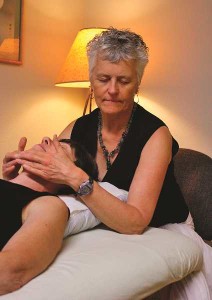
Heather performing reiki
(Credit: Sandy Post: Photo: Kylie Wray)
Kathleen: How interesting! I’d like to go back to the water aspect in a moment, but first, can you tell me a little bit more about Reiki — what is it and how it works?
Heather: Sure. As I said before, Reiki is Japanese for “spiritually guided life force energy.” It is somewhat similar to the disciplines of acupuncture and acupressure in that it helps to redirect energy flow. But there is no manipulation: I simply direct energy by placing my hands gently on the client’s body. In some cases my hands never touch the client at all.
Kathleen: So you direct the energy in the client’s body in a way that promotes healing?
Heather: Not exactly. Think of me as a conduit between the client and the universal energy that surrounds us all. I tap into that universal energy in much the same way an electrical cord taps into the power in a wall outlet. I then transmit that energy to the client, and his body/mind/spirit responds in the way that’s appropriate for him.
After a session, clients often tell me that they experienced deeply felt emotions that they were previously unaware of, such as sadness or grief. As those kinds of internal barriers break down and energy flows more freely, profound healing often occurs.

Credit: goinswriter.com
Kathleen: Heather, I’d like to go back a bit and talk about the issue of hydration again. Can you tell me a little bit more about how water intake affects wellness and health?
Heather: Certainly. As I mentioned earlier, our bodies are made up of about 70 percent water, and every single organ system needs water to function well. Yet, most people get nowhere near the amount of water they need. This leads to a state of chronic dehydration that contributes to many health issues, including memory loss, heart disease and kidney problems. It also robs people of energy and leaves them less able to cope with stress. There’s a very good video about this on my website called “Drink Water for Life.”
Kathleen: How much water should a person drink?
Heather: In general, a healthy person should drink the volume of water in ounces that is equal to one-half of his body weight in pounds each day. So, a person who weighs 150 pounds should drink 75 ounces — or about nine or 10 8-ounce glasses of water — every day.
Kathleen: Wow! That’s a lot!
Heather: It seems like a lot, but it’s really not. We just need to train ourselves to do what’s best for our bodies — to develop habits that help us stay well, especially when we are under stress. Caregivers and people who are grieving, especially, tend not to take care of themselves as they should. Drinking enough water is one relatively simple step that they can take to stay as healthy as they can.
One suggestion I give my clients is to put a glass of water by their bedside at night and drink it first thing in the morning, before they get out of bed. I also recommend that they fill a pitcher with the amount of water they need to drink each day and leave it on the kitchen counter as a visual reminder. If they are leaving for a few hours, they just fill a portable container from the pitcher and take it with them. My clients say this strategy works very well.
Kathleen: Thanks for that tip, Heather. I think I’ll try it myself! Do you have any other tips for our readers who are living with grief or other difficult situations, or for people at the end of life?
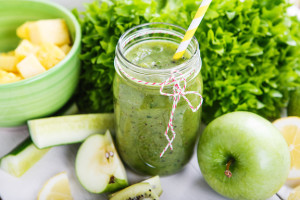
Credit: vegkitchen.com
Heather: Well, nutrition is always a big factor. People who are not physically well, as well as caregivers and those who are dealing with grief and loss tend not to want to (or be able to) sit down and eat a meal several times a day. So, nutritious snacks — fresh fruits and vegetables, high-protein foods such as peanut butter, hard-boiled eggs or edamame — are always a good choice. Also, dark green smoothies made with antioxidant-rich foods such as kale are nutritious and a wonderful boost for the immune system.
Of course, people who are approaching the end of life often will not have an appetite. During the dying process, the body will naturally begin to shut down and the need for food decreases, so we need to honor that.
Kathleen: That’s very true.
Heather: Another thing I like to emphasize to my clients is how important it is to keep their vital energy flowing — to release rather than hold on to their pain. This can be accomplished in many different ways: deep breathing, going outside and taking a brief walk, crying, journaling, art. For those in the midst of grief, sometimes writing a letter to the person who has died or is dying — getting those difficult emotions out in writing — helps as well.
It’s important to remember, too, that each person is an individual and there is no “right” way to deal with illness, grief or one’s impending death. As Beth Howard says in her beautiful book “Making Piece: A Memoir of Love, Loss and Pie,” “Another thing about grief is that it gives you permission to take care of yourself in a way you never knew how to before.”
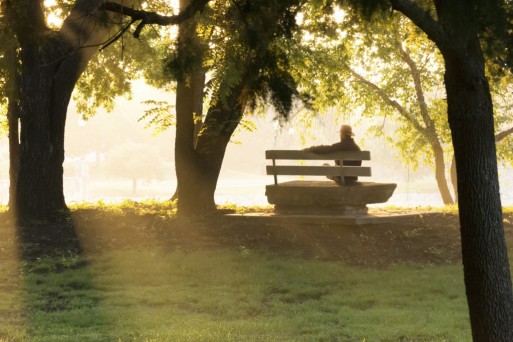
Credit: catholicmatch.com
Kathleen: That’s very profound and very true. People grieve for many different reasons, and in many different ways. We each need to find our own path.
Heather: Yes. We also need to remember that the body has an innate capacity to heal and be well even in the face of impending death. My job, as I see it, is to provide my clients with tools they can use and allow them to make choices based on what feels right for them. There is no one “prescription” that works for everyone all the time.
Kathleen: Thank you, Heather. I really appreciate your insights and I’m sure our readers will as well. Again, thanks for sharing your thoughts with SevenPonds.
Heather: You’re very welcome!

 Can Aromatherapy and Reiki Help with Terminal Illness and End-of-Life Care? An Interview With Heather Michet, Part One
Can Aromatherapy and Reiki Help with Terminal Illness and End-of-Life Care? An Interview With Heather Michet, Part One


 Our Annual Seven Holiday Gifts for Someone Who Is Grieving, 2024 Edition
Our Annual Seven Holiday Gifts for Someone Who Is Grieving, 2024 Edition
 “Making Mobiles” by Karolina Merska
“Making Mobiles” by Karolina Merska
 “Hands Up to the Sky” by Michael Franti & Spearhead
“Hands Up to the Sky” by Michael Franti & Spearhead














